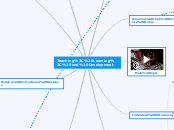Teaching, Learning, and Development
Cognitive, Behavioural, Social, and Constructivist Theory
Constructivism: Acknowledging that students have their own prior knowledge and preconceptions about how the world works. Relevant for science as these preconceptions may be misconceptions, which are hard to displace with factual information.
E.g. Misconceptions about basics of photosynthesis among MIT graduates
Behavioural Approach: Represents the "old school," carrot and stick type classroom/behavioural management approach. In my experience, these are ineffective and treat students as units that are meant to fall in line rather than complex human beings.
Behaviourism: Use of negative reinforcement is less effective than positive reinforcement
Knowing that the Students Know
Assessment: Guided Practice
Assessment FOR Learning
Assessment AS Learning
Formative assessment
Assessment OF Learning
Evaluation = Game Day
Main topic
Individual Differences
Individualized Education Plans
Intelligence: There are MULTIPLE kinds
Emotional/Interpersonal
Physical
Computational
Subtopic
Linguistic
Differentiated Instruction: Try to strive for it whenever possible
End of School Year
Standardized tests
Ongoing debate: How relevant and useful are they?
How culturally appropriate are they?
Teaching to the test
Establishing a Positive Learning Environment
Subtopic
Dynamic Classroom Management: Teachers must set up a multifaceted, proactive approach to ensure the classroom is a calm, safe, and welcoming environment for all students
"Expectations" over "Rules": I prefer setting up classroom "expectations" rather than laying out "rules" as I believe expectations are more friendly and imply a sense of responsibility for both the students and teacher
Planning for the Upcoming School Year
The importance of educational psychology: how do people learn?
Reflective practice: the hallmark of what makes teaching a "profession" and not a "job"
Schwabb's 4 Commonplaces
Teacher
Topic
Environment
Student
Making Instructional Decisions
Stiggins' Targets
Knowledge
Reasoning
Skills
Product
Affective
Bloom's Taxonomy
Remember
Understand
Apply
Analyze
Evaluate
Create
Make science fun!
Socio-Cultural Considerations
Intersectionality in Education
Decolonizing Pedagogy
One of the biggest determinants of student achievement = SES
